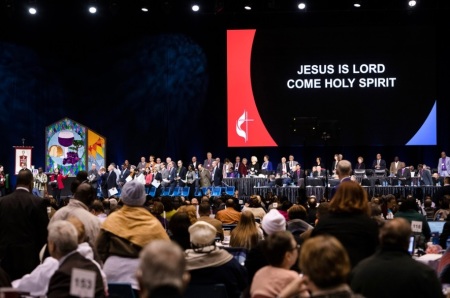United Methodist conference creates 'reaffiliation' policy after nearly 200 churches disaffiliate

A regional body of The United Methodist Church has implemented a reaffiliation policy for congregations that have left amid the denomination-wide schism over homosexuality.
The UMC Alabama-West Florida Conference implemented the new reaffiliation policy earlier this month, acting off of a resolution passed at its annual session in June.
Conference Communications Director Mary Catherine Phillips told The Christian Post on Thursday that the conference had no reaffiliation process before the policy was introduced.
“The United Methodist Book of Discipline, paragraph 259, provides guidance for new churches in the UMC but the financial pieces of reentry were not outlined, so it would have been on a case-by-case basis,” she explained.
“We welcome other conferences to follow this process as it gives options to churches who might have rushed into a decision and might not have fully understood the ramifications.”
Over the past few decades, the UMC has been engaged in a divisive debate over whether to allow the blessing of same-sex unions and the ordination of people in same-sex romantic relationships.
Many progressives in church leadership have refused to follow or enforce the rules in the UMC Book of Discipline that ban same-sex unions and the ordination of gay clergy, which has drawn the ire of theologically conservative churches and leaders.
In the past two years, over 6,000 congregations have disaffiliated from what was once the second-largest Protestant denomination in the U.S., taking advantage of the provisions under Paragraph 2553 of the UMC Book of Discipline, which expires at the end of the year.
Phillips directed CP to a recent report by the conference, which noted that the measure was originally introduced by Nathan Attwood, senior pastor at First United Methodist Church of Marianna, Florida.
“On the very day that the Prodigal Son left home, the father began to make preparations for his return, and so it is our responsibility as followers of Jesus Christ, as the spiritual home of the churches who have left, to make sure that the light is on, there’s a plate in the oven, and that we are ready to receive them with open arms,” said Attwood.
“When our denomination divided in 1844 over the issue of slavery, the deepest division in our history, it took 95 years for reconciliation to take place; and that process is still ongoing. There’s no reason it should take 95 years or more for us to reconcile.”
According to the policy, a church disaffiliated under Paragraph 2553 is eligible for reaffiliation if it brings its church property with it, has a minimum of 50 members, and shows financial sustainability.
The reaffiliating church must hold a congregational vote in which either a simple majority or a supermajority approves the measure, depending on the rules that govern the local church.
If successfully reaffiliated, the conference will “forgive the first year’s apportionments that the local church would have otherwise been required to pay to the Conference” provided the congregation had disaffiliated from the UMC within three years of when local church leadership contacted the local district superintendent as part of the process.
In May, the Alabama-West Florida Conference voted to approve the disaffiliations of 193 congregations, or 38% of the local churches in the regional body and 39% of its membership.
Alabama-West Florida Bishop David Graves said in a statement on the day of the vote that it was “a somber day in the life of the Alabama-West Florida Conference.”
“We grieve in saying farewell to the 193 churches disaffiliating from the United Methodist Church and wish them the best in ministry,” said Graves at the time. “Many of these churches have dedicated clergy and laity who truly desire to serve God and their communities.”
“I especially want to thank those churches who have decided to remain United Methodist and those who heard my call to refrain from holding discussions around leaving the denomination until we have more information.”





















